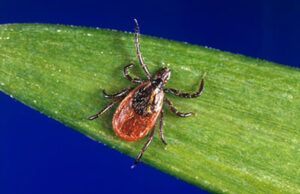
Professor Durland Fish, an epidemiologist at Yale School of Public Health, reminds readers in an article published in Business Insider of the importance in recognizing the following six tick-borne diseases: [1]
1. Lyme disease
2. Babesiosis
3. Anaplasmosis
4. Borrelia miyamotoi
5. Ehrlichiosis
6. Powassan virus
Fish discusses the Powassan virus in detail in the article, pointing out that the number of cases remains uncertain. “Doctors have now detected Powassan in New England, New York, Wisconsin, and Minnesota ─ though only about 75 cases have been reported over the last 10 years.” [1] Cases may be underreported “since doctors in many areas don’t have the ability to detect Powassan or may not know to look for it.”

The virus may have been with us all along. “Until recently, Powassan hadn’t been tested for in many places,” says Tokarz, an associate research scientist at Columbia University’s Mailman School of Public Health. “So the uptick may just be due to the fact that we’ve started looking for it.” [2]
As concern grows over the rising number of tick-transmitted diseases, researchers have developed more effective tests to determine which infections ticks may be carrying. For example, Bartonella henselae, which has been identified in ticks in both Europe [3,4] and the United States, was found in black-legged ticks in New Jersey, New York and Pennsylvania. [5] Meanwhile, a recent study found 4.7% of deer ticks in northwestern Wisconsin carried the Powassan virus. [6]
Researchers found 50% of the 8 ticks that were positive for the Powassan virus were co-infected with Borrelia burgdorferi, the bacterium causing Lyme disease. According to Knox and colleagues, this demonstrates the “potential for concurrent transmission of [Lyme disease] and Powassan virus (POWV) to humans.” [6]
It’s imperative that the medical community begin to address the “one bite, six diseases” tick problem.
References:
- A single tick bite could put you at risk for at least 6 different diseases by Kevin Loria in Business Insider June 28, 2017 at https://www.businessinsider.com/deer-tick-can-carry-lyme-disease-powassan-virus-babesiosis-and-more-2017-6. Last accessed 7/2/17.
- A little-known tick-borne infection could have permanent or fatal consequences by Kevin Loria in Business Insider June 27, 2017 at https://www.businessinsider.com/deer-tick-powassan-virus-lyme-disease-risk-2017-6. Last accessed 7/2/17.
- Raileanu C, Moutailler S, Pavel I, et al. Borrelia Diversity and Co-infection with Other Tick Borne Pathogens in Ticks. Frontiers in cellular and infection microbiology. 2017;7:36.
- Schouls LM, Van De Pol I, Rijpkema SG, Schot CS. Detection and identification of Ehrlichia, Borrelia burgdorferi sensu lato, and Bartonella species in Dutch Ixodes ricinus ticks. J Clin Microbiol. 1999;37(7):2215-2222.
- Nelder MP, Russell CB, Sheehan NJ, et al. Human pathogens associated with the blacklegged tick Ixodes scapularis: a systematic review. Parasit Vectors. 2016;9:265.
- Knox KK, Thomm AM, Harrington YA, Ketter E, Patitucci JM, Carrigan DR. Powassan/Deer Tick Virus and Borrelia Burgdorferi Infection in Wisconsin Tick Populations. Vector Borne Zoonotic Dis. 2017.



I am so happy to see the medical community finally addressing tick borne diseases as the pandemic they are. Based in upstate NY, I attended a medical conference with an “expert” presenter who used an algorithum and suggested there was not much need for Lyme testing in our area. I knew better from my own research and yet the prevailing thought was not to address the facts. Thank you Dr. Cameron for doing all you are doing to get the truth out!
I have known for the 20 years I have been infected, that Minnesota was maintaining a “cover up” of Lyme disease.
This is criminal and now there is still little education given throughout the USA. I have had 2 dogs die with a diagnosis in the past years so the vets were “onto it”!
I have known for the 20 years I have been infected, that Minnesota was maintaining a “cover up” of Lyme disease.
This is criminal and now there is still little education given throughout the USA. I have had 2 dogs die with a diagnosis in the past years so the vets were “onto it”!